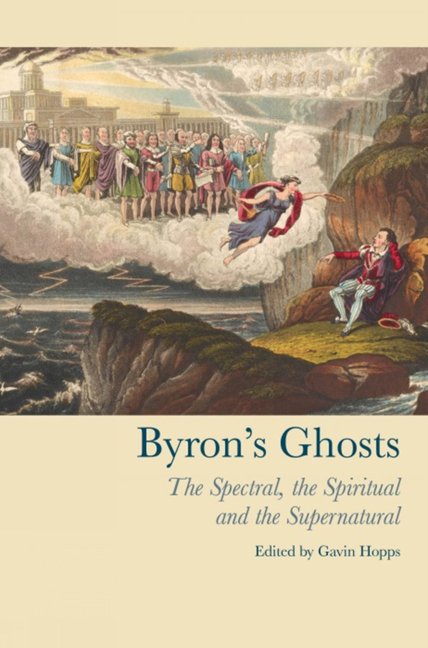Book contents
- Frontmatter
- Dedication
- Contents
- Acknowledgements
- Texts and Abbreviations
- Introduction: The Re-Enchantment of Romanticism
- Chapter 1 Determining Unknown Modes of Being: A Map of Byron's Ghosts and Spirits
- Chapter 2 Shades of Being: Byron and the Trespassing of Ontology
- Chapter 3 Byron and the Noonday Demons
- Chapter 4 Conjuration and Exorcism: Byron's Spectral Rhetoric
- Chapter 5 Byron avec Sade: Material and Spectral Violence in Childe Harold's Pilgrimage Canto IV
- Chapter 6 ‘’Twixt Life and Death’: Childe Harold's Pilgrimage, Don Juan and the Sublime
- Chapter 7 Byron, Ann Radcliffe and the Religious Implications of the Explained Supernatural in Don Juan
- Chapter 8 The Haunting of Don Juan
- Chapter 9 Being neither Here nor There: Byron and the Art of Flirtation
- Afterword: Blowing on a Dead Man's Embers: Byron's Biographical Ghosts
- Bibliography
- Notes on Contributors
- Index
Chapter 3 - Byron and the Noonday Demons
- Frontmatter
- Dedication
- Contents
- Acknowledgements
- Texts and Abbreviations
- Introduction: The Re-Enchantment of Romanticism
- Chapter 1 Determining Unknown Modes of Being: A Map of Byron's Ghosts and Spirits
- Chapter 2 Shades of Being: Byron and the Trespassing of Ontology
- Chapter 3 Byron and the Noonday Demons
- Chapter 4 Conjuration and Exorcism: Byron's Spectral Rhetoric
- Chapter 5 Byron avec Sade: Material and Spectral Violence in Childe Harold's Pilgrimage Canto IV
- Chapter 6 ‘’Twixt Life and Death’: Childe Harold's Pilgrimage, Don Juan and the Sublime
- Chapter 7 Byron, Ann Radcliffe and the Religious Implications of the Explained Supernatural in Don Juan
- Chapter 8 The Haunting of Don Juan
- Chapter 9 Being neither Here nor There: Byron and the Art of Flirtation
- Afterword: Blowing on a Dead Man's Embers: Byron's Biographical Ghosts
- Bibliography
- Notes on Contributors
- Index
Summary
Thou shalt not be afraid for the terror by night;
Nor for the arrow that flieth by day;
Nor for the pestilence that walketh in darkness;
Nor for the destruction that wasteth at noonday.
(Psalm 91: 5–6)In his journal of 1821, Byron sets out a problem that concerns the secular, aristocratic condition of ennui :
What is the reason that I have been all my lifetime, more or less ennuyé? […] I presume that it is constitutional, as well as the waking in low spirits which I have invariably done for many years. Temperance and exercise, which I have practised at times, and for a long time vigorously and violently, made little or no difference. Violent passions did.
Ennui, a state of melancholic boredom, is associated with aristocrats and aesthetes, those with time on their hands. Byron, himself an aristocrat and aesthete, had an experimental approach towards the resolution of his condition. He tries temperance and exercise with no success, but he finds that ‘violent passions’ help in combating the condition. Byron, perhaps sadly or most probably wryly, associates his problem with a particular time of the day, ‘waking in low spirits’. His analysis that it is ‘constitutional’ is roughly similar to the Augustinian notion of Original Sin or the now fashionable reference to DNA and genetic inheritance, in that he feels that he was born into his condition and, despite continuous efforts, cannot easily change it. Byron's analysis is not wholly solipsistic but is it, in any way, spiritual? This essay sets out to present a sequence of ideas that locates the secular categories of ennui and melancholy more precisely as the silhouettes of the Greek and Scholastic theological term acedia, which has been loosely translated from the term that describes a spiritual condition of the Desert Fathers, understood as ‘the noonday demon’.
Such an argument is not without precedent. Jerome Mcgann, in his essay ‘Byron's Lyric Poetry’, observes: ‘Romanticism is regularly and usefully characterised in terms lifted from a certain set of adjectives, such as: subjective, impassioned, personal, sincere, spontaneous, reflective, self-conscious.’
- Type
- Chapter
- Information
- Byron's GhostsThe Spectral, the Spiritual and the Supernatural, pp. 83 - 96Publisher: Liverpool University PressPrint publication year: 2013



